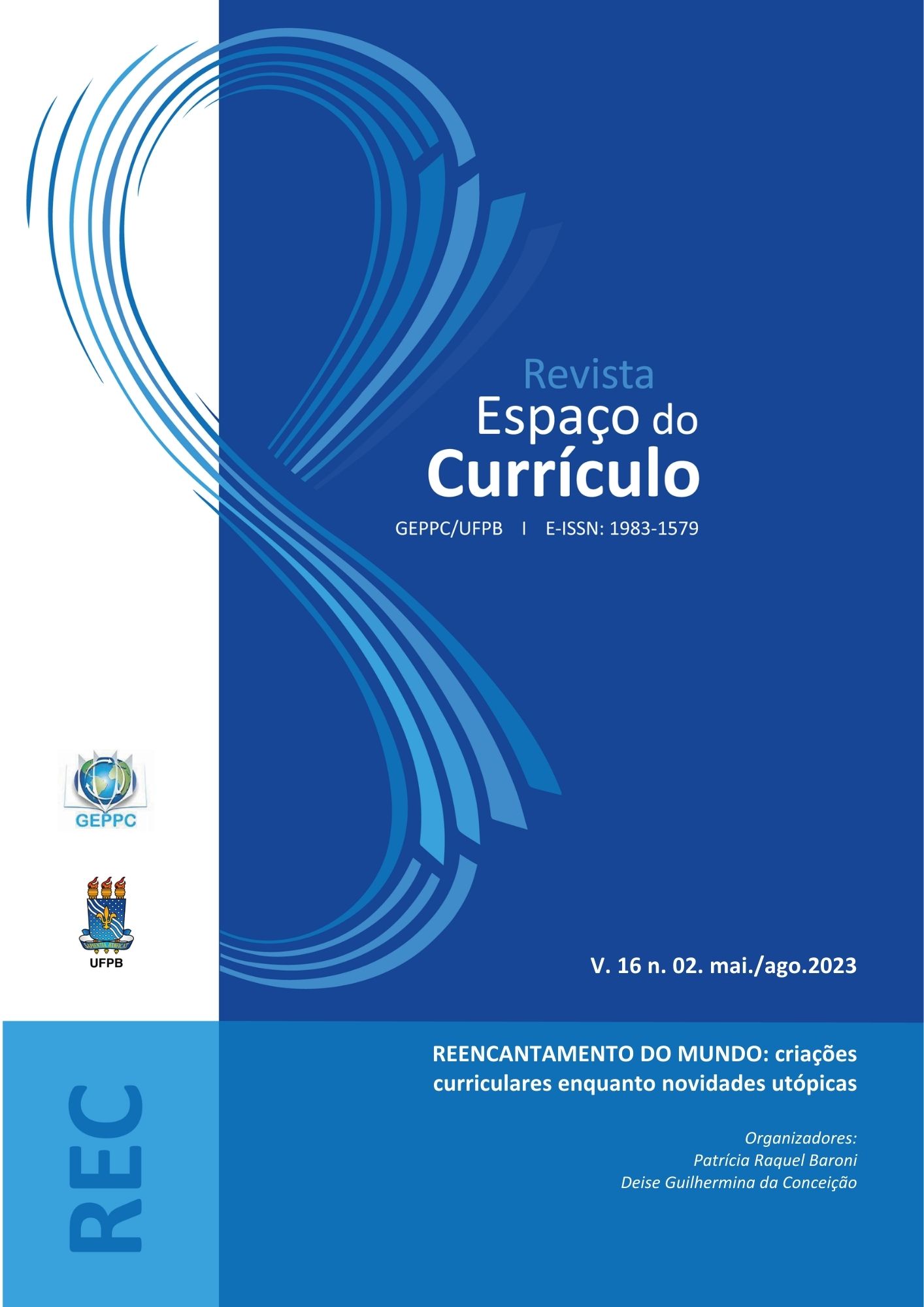EXPERIMENT AND INVENT CURRICULUM MOVEMENTS FOR A BEAUTIFUL LIFE
DOI:
https://doi.org/10.15687/rec.v16i2.67254Keywords:
Inventive resumes, Active micropolicies, Collective resistancesAbstract
This text composes a master's research that maps active micropolitics movements, in an elementary school, to problematize the inventive curricular movements that can be produced in this relationship. It dialogues with Deleuze and Guattari (2011, 2018) to think about education in a different way, from the perspective of creation. Betting on art intertwined with the curricula as a possibility of transporting to other possibilities and on cartography, as a methodology, to problematize: what inventive curricular movements can collective bodies constitute with the intention of affirming a beautiful life in the school routine? It argues that, among forms and forces that operate in the school routine, there are resistance processes that affirm life. It concludes (always open to the new) that it is indeed possible to bet on the school as a collective body, because between macro/micropolitics, there is the creation of inventive curricular movements that escape the established hegemonic standards and affirm a beautiful life in the school routine.
Downloads
Metrics
References
ALVES, Nilda. Sobre as redes educativas que formamos e que nos formam. In: Alves, Nilda. Práticas pedagógicas em imagens e narrativas – memórias de processos didáticos e curriculares para pensar as escolas hoje. S. Paulo: Cortez, 2019: 115–133.
ALVES, Nilda; ANDRADE, Nívea; CALDAS, Alessandra Nunes. Os movimentos necessários às pesquisas com os cotidianos – após muitas ‘conversas’ acerca deles. In: OLIVEIRA, Inês Barbosa de; PEIXOTO, Leonardo; SUSSUKIND, Maria Luiza (org.). Estudos do cotidiano, currículo e formação docente - questões metodológicas, políticas e epistemológicas. Curitiba: CRV, 2019.
BARROS, Manoel de. Memórias inventadas. Rio de janeiro: Alfaguara, 2018.
BARROS, Manoel de. Meu quintal é maior do que o mundo. 1. ed. Rio de Janeiro: Objetiva, 2015.
BARROS, Manoel de. O livro das ignorãças. Rio de Janeiro: Alfaguara, 2016.
BARROS, Maria Elizabeth Barros de. Procurando outros paradigmas para a educação. Educação & Sociedade, ano XXI, n. 72, agosto/00.
CARVALHO, Janete Magalhães. O currículo como comunidade de afetos/afecções. Revista Teias, v. 13. Rio de Janeiro. 2011.
CARVALHO, Janete Magalhães. O não-lugar dos professores nos entrelugares de formação continuada. Revista Brasileira de Educação. Janeiro-abril, N. 28. Rio de Janeiro. 2005.
COSTA, Luciano Bedin da; AMORIM, Alexandre Sobral Loureiro. Uma introdução à teoria das linhas para a cartografia. Atos de Pesquisa em Educação. Blumenau, v. 14, n. 3, p. 912-933, set./dez. 2019.
DELEUZE, Gilles. Conversações. Trad. Peter Pál Pelbart. Ed. 34, São Paulo, 1992.
DELEUZE, Gilles. Diferença e repetição. Trad. Luiz Orlandi e Roberto Machado. Editora: Paz & Terra; 3. ed. 2018.
DELEUZE, Gilles. Proust e os signos. 2. ed. Tradução de Antônio Piquet e Roberto Machado. Rio de Janeiro: Forense Universitária, 2003.
DELEUZE, Gilles; GUATTARI, Felix. Mil platôs: capitalismo e esquizofrenia. Tradução de Ana Lúcia de Oliveira, Aurélio Guerra Neto e Célia Pinto Costa. v. 1. Rio de Janeiro: Ed. 34, 2011, 128 p.
DELEUZE, Gilles; GUATTARI, Felix. Mil platôs: capitalismo e esquizofrenia. Tradução de Aurélio Guerra Neto, Ana Lúcia de Oliveira, Lúcia Cláudia Leão e Suely Rolnik. v. 3. São Paulo: Ed. 34, 2012, 144 p.
DELEUZE, Gilles; PARNET, Claire. Diálogos. Trad. Eloisa Araújo Ribeiro. São Paulo: Escuta, 1998.
DELEUZE, Gilles; PARNET, Claire. O abecedário de Gilles Deleuze (transcrição + vídeo completo), 1989. Disponível em: http://clinicand.com/o-abecedario-de-gilles-deleuze/. Acesso em: 10 maio 2022.
ESCÓSSIA, Liliana da; KASTRUP, Virgínia; PASSOS, Eduardo (org.). Pistas do método da cartografia: pesquisa-intervenção e produção de subjetividade. Porto Alegre: Sulina, 2009.
ESTEBAN, Maria Teresa. O que sabe quem erra? 2. ed. Petrópolis, RJ: De Petrus et Alii, 2013. 200p.
GALLO, Silvio. Deleuze & a Educação. 3. Ed. Belo Horizonte: Autêntica Editora, 2017.
GUATTARI, Felix. Caosmose – Um novo paradigma estético. Trad. Ana Lúcia Oliveira de Oliveira e Lúcia Cláudia Leão. Ed. 34. Rio de Janeiro, 1992.
KASTRUP, Virgínia. Aprendizagem, arte e invenção. Psicologia em Estudo. Maringá, v. 6. 2001.
PARAÍSO, Marlucy Alves. Metodologias de pesquisas pós-críticas em educação e currículo: trajetórias, pressupostos, procedimentos e estratégias analíticas. In Meyer, Paraíso. Metodologias de pesquisas pós-críticas em educação. Belo Horizonte: Mazza Edições, 2012.
PARAÍSO, Marlucy Alves. Um currículo entre formas e forças. Educação (Porto Alegre, impresso), v. 38, n. 1, p. 49-58, jan./abr. 2015.
ROLNIK, Suely. A hora da micropolítica. Série Pandemia. Ed. N-1, 2015.
SPINOZA, Baruch. Ética. Tradução de Tomaz Tadeu. Belo Horizonte: Autêntica Editora, 2009.
Downloads
Published
How to Cite
Issue
Section
License
Copyright (c) 2023 Curriculum Space Journal

This work is licensed under a Creative Commons Attribution 4.0 International License.
By submitting an article to Curriculum Space Journal (CSJ) and having it approved, the authors agree to assign, without remuneration, the following rights to Curriculum Space Journal: first publication rights and permission for CSJ to redistribute this article. article and its metadata to the indexing and reference services that its editors deem appropriate.
















